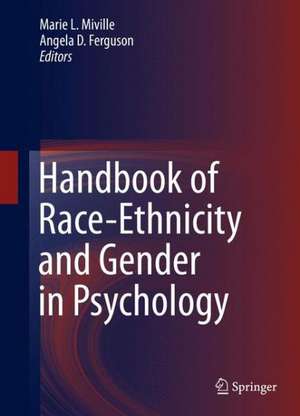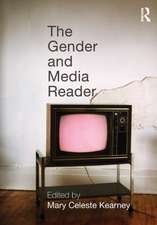Handbook of Race-Ethnicity and Gender in Psychology
Editat de Marie L. Miville, Angela D. Fergusonen Limba Engleză Hardback – 5 feb 2014
| Toate formatele și edițiile | Preț | Express |
|---|---|---|
| Paperback (1) | 1227.99 lei 6-8 săpt. | |
| Springer – 26 aug 2016 | 1227.99 lei 6-8 săpt. | |
| Hardback (1) | 1230.04 lei 6-8 săpt. | |
| Springer – 5 feb 2014 | 1230.04 lei 6-8 săpt. |
Preț: 1230.04 lei
Preț vechi: 1500.05 lei
-18% Nou
Puncte Express: 1845
Preț estimativ în valută:
235.36€ • 245.74$ • 194.80£
235.36€ • 245.74$ • 194.80£
Carte tipărită la comandă
Livrare economică 04-18 aprilie
Preluare comenzi: 021 569.72.76
Specificații
ISBN-13: 9781461488590
ISBN-10: 1461488591
Pagini: 700
Ilustrații: XII, 412 p. 5 illus. in color.
Dimensiuni: 178 x 254 x 30 mm
Greutate: 0.95 kg
Ediția:2014
Editura: Springer
Colecția Springer
Locul publicării:New York, NY, United States
ISBN-10: 1461488591
Pagini: 700
Ilustrații: XII, 412 p. 5 illus. in color.
Dimensiuni: 178 x 254 x 30 mm
Greutate: 0.95 kg
Ediția:2014
Editura: Springer
Colecția Springer
Locul publicării:New York, NY, United States
Public țintă
ResearchCuprins
Part I: Identity, Worldviews and Cultural Belief Systems: Intersections of Race-Ethnicity and Gender on Identity Development and Social Roles.- Exploring the Intersections of Religion and Spirituality with Race-Ethnicity and Gender in Counseling.- Intersections of Race-Ethnicity, Gender and Sexual Minority Communities.- Race-Ethnicity and Gender in Older Adults.- Part II—Family, Group and Community Systems: Immigration and Human Rights.- Poverty at the Intersections: Implications for Socially-Just Community-Based Practice.- Exploring the Intersection of Parenting, Ethnicity, Race and Gender in the Deconstruction of the Nuclear Family Archetype.- Taking Stock of the Intersection of Race, Gender and Crime: Statistics, Theory and Correctional Applications.- Race-Ethnicity and Gender in Higher Education.- Part III—Career and Organizational Development: Career Development of Men of Color.- Women of Color in the Workplace: Supports, Barriers and Interventions.- Leading with Our Whole Selves: A Multiple Identity Approach to Leadership Development.- In the Boardroom/Out of the Loop: Group and Organizational Dynamics.- Part IV—Clinical Applications: Theories, Models and Practices for Understanding: Gender, Race and Ethnicity in Clinical Assessment.- But Some of the Therapists are Black.- Consistently Inconsistent: A Review of the Literature on Eating Disorders and Body Image among Women of Color.- Men of Color and Eating Disorders.- Domestic Violence: What Every Multicultural Clinician Should Know.
Notă biografică
Marie L. Miville, Ph.D., is an Associate Professor of Psychology and Education in the Department of Counseling and Clinical Psychology at Teachers College, Columbia University. Dr. Miville has conducted research and developed workshops on social attitudes and universal-diverse orientation, Latino/a mental health, and the interrelations of various aspects of identity, as based on race, culture, gender, and sexual orientation among populations of color. Dr. Miville is the author of over 50 publications and several training DVD’s dealing with multicultural issues in counseling and psychology. Dr. Miville is the Director of the Winter Roundtable on Cultural Psychology and Education at Teachers College, and is Editor of the Around the Winter Roundtable Forum for The Counseling Psychologist. She is serving or has served on several editorial boards, including Journal of Counseling Psychology, Cultural Diversity and Ethnic Minority Psychology, Assessment, and Training and Education in Professional Psychology. Dr. Miville is the Historian of the National Latina/o Psychology Association and a Fellow of the American Psychological Association (Division 17 and 45).
Angela D. Ferguson, Ph.D. is an Associate Professor at Howard University. Prior to her arrival at Howard University, Dr. Ferguson worked at George Washington University in the Organizational Sciences Department and at the University of Florida as a staff psychologist in the Counseling Center. She has also served as a researcher and consultant to organizations, such as the Landmine Survivors Network (an NGO) – Washington, DC and the American Red Cross, National Headquarters – Washington, DC. Dr. Ferguson’s research and scholarly work have focused on two major areas: a) intersections of multiple identities, specifically examining the interaction of multiple forms of social oppression for communities of color on identity development; and b) trauma and resilience factors in culturally diversepopulations. Her research infuses a cultural perspective relative to the ways in which the sociopolitical and historical experiences of oppressed, marginalized groups influences social, emotional, and sociocultural aspects of decision making, and personal and group identity. She has published several book chapters and articles focused on both areas and made numerous presentations at local, national, and international professional conferences.
Angela D. Ferguson, Ph.D. is an Associate Professor at Howard University. Prior to her arrival at Howard University, Dr. Ferguson worked at George Washington University in the Organizational Sciences Department and at the University of Florida as a staff psychologist in the Counseling Center. She has also served as a researcher and consultant to organizations, such as the Landmine Survivors Network (an NGO) – Washington, DC and the American Red Cross, National Headquarters – Washington, DC. Dr. Ferguson’s research and scholarly work have focused on two major areas: a) intersections of multiple identities, specifically examining the interaction of multiple forms of social oppression for communities of color on identity development; and b) trauma and resilience factors in culturally diversepopulations. Her research infuses a cultural perspective relative to the ways in which the sociopolitical and historical experiences of oppressed, marginalized groups influences social, emotional, and sociocultural aspects of decision making, and personal and group identity. She has published several book chapters and articles focused on both areas and made numerous presentations at local, national, and international professional conferences.
Textul de pe ultima copertă
We each have multiple identities that have varying degrees of importance. But when identity comes with a history of second-class citizenship, its psychological and social impact can be felt in all aspects of life, especially if more than one identity carries these experiences.
The Handbook of Race-Ethnicity and Gender in Psychology gives clinicians up-to-date findings on its subject and guidelines for incorporating this knowledge into effective practice. Contributors apply intersectional models of diversity to clinical topics (the therapeutic relationship, assessment), social experience (families, spirituality), life-course concerns (education, career development, education, aging), and social justice issues (immigration, crime and correctional interventions). Through these many contexts, practitioners are given more accurate and responsive ways of providing services to a wider range of diverse clients. Included in the Handbook:
The Handbook of Race-Ethnicity and Gender in Psychology gives clinicians up-to-date findings on its subject and guidelines for incorporating this knowledge into effective practice. Contributors apply intersectional models of diversity to clinical topics (the therapeutic relationship, assessment), social experience (families, spirituality), life-course concerns (education, career development, education, aging), and social justice issues (immigration, crime and correctional interventions). Through these many contexts, practitioners are given more accurate and responsive ways of providing services to a wider range of diverse clients. Included in the Handbook:
- Intersections of race-ethnicity, gender, and sexual minority communities.
- Poverty at the intersections: Implications for socially just community-based practice.
- Exploring the intersection of parenting, ethnicity, race, and gender in the deconstruction of the nuclear family archetype.
- A multiple-identity approach to leadership development.
- Eating disorders and body image among women and men of color.
- Domestic violence: What every multicultural clinician should know.
Caracteristici
Only book to focus on race-ethnicity and gender in psychology Enhances current multicultural literature Next-generation” approach to diverse mental health issues Addresses needs of underserved and marginalized populations Appeals to early career professionals and professionals-in-training who are disenchanted with current unidimensional approaches Enhances expertise of mid-career and senior professionals Includes supplementary material: sn.pub/extras














